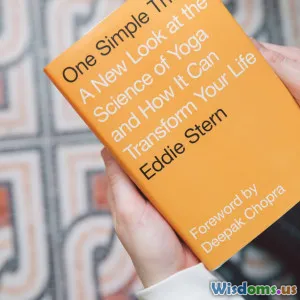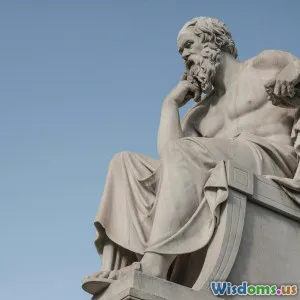
Science and Spirituality: A Philosophical Lens
7 min read Explore how science and spirituality intersect through a philosophical lens, revealing profound insights and new perspectives. (0 Reviews)
Science and Spirituality: A Philosophical Lens
Introduction
In a world often divided between empiricism and faith, the dialogue between science and spirituality can seem fraught with irreconcilable differences. Yet, through a philosophical lens, this dichotomy reveals a far richer conversation—one that is not just about opposing worldviews but about complementary quests for understanding the nature of reality and existence. How do these domains overlap? Where do they conflict? And what might philosophy teach us about their interplay?
This article explores the intersection of science and spirituality with a focus on philosophical inquiry. It unpacks their foundational principles, examines historical and modern perspectives, and encourages readers to appreciate how science and spirituality can mutually enrich human comprehension.
The Distinct Foundations of Science and Spirituality
The Empirical Roots of Science
Science is grounded in empiricism—the idea that knowledge is primarily derived from sensory experience and measurable evidence. From Newtonian mechanics to quantum physics, science relies on observation, experimentation, and reproducibility as its cornerstones. For example, the development of vaccines in the 20th century not only showcases scientific rigor but also emphasizes how hypotheses about disease processes can be validated or falsified systematically.
Scientific knowledge is tentative, always open to refinement or refutation. This tentative nature fosters progress but also underscores a natural humility in claiming absolute truths.
Spirituality’s Quest Beyond the Measurable
Spirituality often addresses questions that transcend direct observation, like the nature of consciousness, the existence of the soul, or the presence of a higher power. It relies on subjective experience—meditation, prayer, mystical insight—and tradition.
Philosophers, from William James to contemporary thinkers, have analyzed spirituality as a deeply personal and lived experience, one not easily reduced to empirical measurement. For example, many meditation practitioners report enhanced well-being and altered states of consciousness, phenomena that science can measure only indirectly but spirituality explains experientially.
Philosophy: The Bridge and the Battleground
Epistemology: Understanding Knowledge
Philosophy of knowledge (epistemology) questions how we know what we know. It challenges both scientific and spiritual claims, probing their foundations critically.
Immanuel Kant, for instance, suggested our understanding of the world is mediated by the mind’s inherent structures, resonating with spirituality's knowledge through intuition and experience. Concurrently, logical positivists criticized unverifiable spiritual claims as meaningless, advocating a scientifically grounded epistemology.
This debate highlights the philosophical complexity in assessing knowledge claims from science and spirituality.
Metaphysics: Inquiry into the Nature of Reality
Science explains phenomena through cause-and-effect relationships in space and time. However, metaphysics asks: What is ultimately real? Is reality only material, or does it include immaterial dimensions?
Quantum physics unsettles classical materialism; waves of probabilistic fields and particle entanglement hint at interconnectedness, a concept familiar to spiritual traditions like Buddhism that speak of interdependence.
Some philosophers, such as David Chalmers, emphasize the “hard problem” of consciousness—how subjective experience arises from physical processes—a mystery at the heart of both scientific investigation and spiritual inquiry.
Historical Perspectives: Converging Paths and Divergences
The Renaissance and Enlightenment
Early scientists such as Isaac Newton were deeply spiritual, seeing their work as uncovering divine order. The Enlightenment shifted this view towards secularism, emphasizing human reason and skepticism.
However, figures like Blaise Pascal acknowledged the limits of reason and affirmed a “leap of faith,” an idea that resonates with the spiritual quest.
Contemporary Dialogue: Science as Complement to Spirituality
Today, a growing number of scholars investigate science and spirituality as complementary rather than contradictory. For instance, the field of neuroscience studies meditation’s effects on the brain, elucidating ancient spiritual practices through scientific understanding.
Moreover, theoretical physicists like Carlo Rovelli explore the notion of a relational universe, where relations rather than objects compose reality—echoing spiritual notions of unity.
Practical Examples and Insights
-
Mindfulness and Mental Health: Scientific research confirms mindfulness-based interventions reduce stress, anxiety, and depression—bridging spiritual practice and empirical validation.
-
Placebo Effect: This showcases how belief and expectation—fundamentals in spirituality—can induce measurable physiological changes, revealing a mind-body connection.
-
Cosmology and Creation: The Big Bang theory raises philosophical questions akin to theological creation narratives, inviting shared wonder and exploration.
Conclusion: Toward a Unified View?
While science seeks to explain the "how" of the universe, spirituality often contemplates the "why." Philosophy serves as an essential mediator, challenging, contextualizing, and sometimes harmonizing these perspectives.
The journey toward integrating science and spirituality through philosophical inquiry requires openness and intellectual humility. By appreciating the strengths and limits of each domain, we can cultivate a more nuanced worldview—one that values both empirical rigor and the transcendental dimensions of human experience.
Embracing this interdisciplinary dialogue not only enriches personal understanding but may pave the way for innovative approaches to life’s greatest mysteries. In the words of Albert Einstein, “Science without religion is lame, religion without science is blind.” Through philosophy, we gain sight and motion to explore the synergy between science and spirituality.
References:
- William James, The Varieties of Religious Experience (1902)
- David Chalmers, The Conscious Mind (1996)
- Carlo Rovelli, Reality Is Not What It Seems (2016)
- Jon Kabat-Zinn, Wherever You Go, There You Are (1994)
- Immanuel Kant, Critique of Pure Reason (1781)
Rate the Post
User Reviews
Popular Posts















